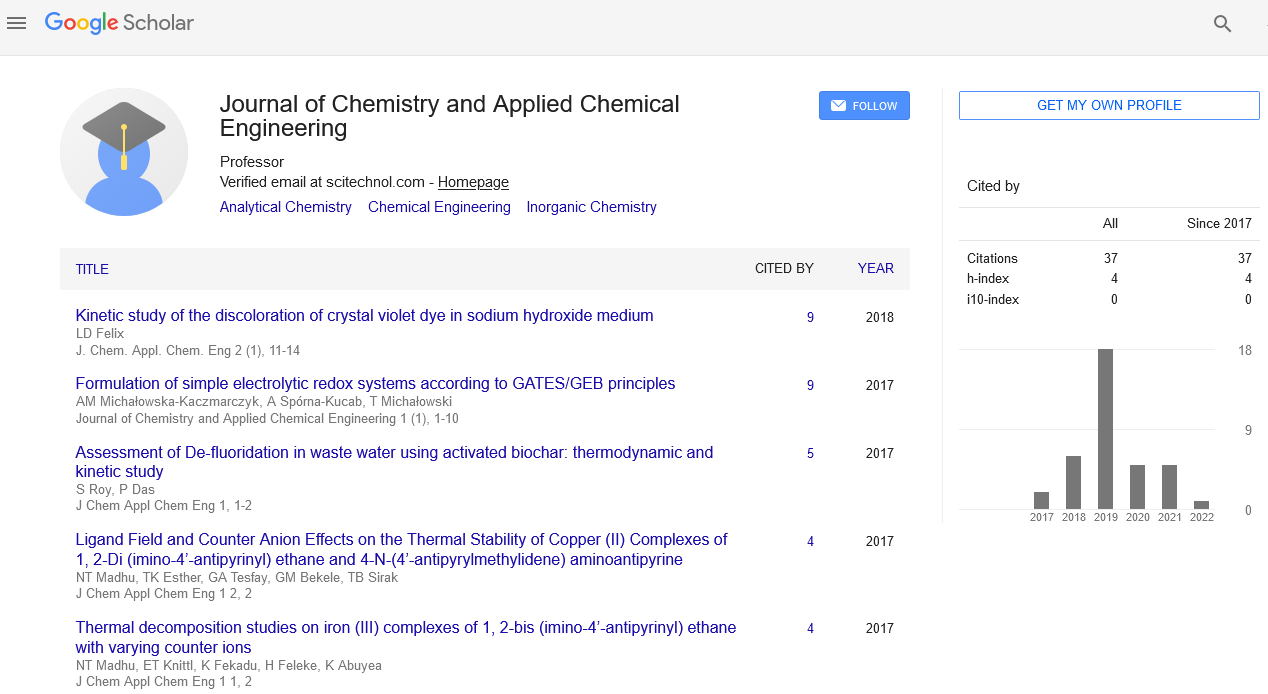Phosphatidilcoline liposomes that encapsulate antioxidants. Application to a biopolimeric matrix
Johana Lopez-Polo, Fernando A. Osorio, Andrea Silva-Weiss, Marcela Zamorano and Begona Gimenez
Universidad de Santiago de Chile, Chile
: J Chem Appl Chem Eng
Abstract
Statement of the Problem: Oxidation is a major cause of rancidity in fats and oils worldwide. Encapsulating the antioxidants within liposomes have been employed to avoid the oxidation. Liposomes are nanovesicles consist of lipid molecules as phospholipids with a hydrophilic head and hydrophobic fatty acid tail. These liposomes can transport and control the release hydrophilic, lipophilic and amphiphilic compounds. Many investigations have reported that liposomes with antioxidant may be incorporated in biopolymers could reduce lipid oxidation. In this work, were evaluated physical and chemical properties of liposomes that encapsulate quercetin-3-rutinoside and they are incorporated into a biopolymer matrix.
Methodology & Theoretical Orientation: Liposomes rutin-containing based on phosphatidylcholine were prepared using heating/homogenization method. Liposomes were added in hydroxylpropylmethylcellulose matrix using glycerol as a plasticizer. The size, zeta potential, polydispersity, morphology and ABTS radical scavenging assay were determined for the physical and chemical characterization of liposomes. Rheological measurements were performed in a rheometer. The release of rutin from the matrix was evaluated by HPLC.
Findings: The average diameter values obtained indicated that the liposomes correspond to large nanovesicles. The polydispersity was of 0.300 indicating that are monodisperse. The Z potential between -64.8 and -52.0 mV were observed, so they may be considered stable. TEM images show spherical and unilamellar liposomes. At 25°C the suspensions exhibited a thin liquid-like behavior while increasing the temperature to 45°C resulted in a gel-like behavior. Rutin was released more slowly from the matrix to a fatty food simulant when it was encapsulated in liposomes.
Conclusion & Significance: Liposomes of nanometric size and stable were obtained. A controlled release over time of rutin was observed when liposomes were incorporated in the matrix. The results obtained highlight the relevance of using an encapsulation technology such as liposomes, able to preserve antioxidants and control their release, to avoid rancidity in fats and oils and improving food shelf life.
Recent Publications
1. Bermudez-Oria, A., Rodriguez-Gutierrez, G., Rubio-Senent, F., Fernandez-Prior, A., & Fernandez-Bolaños, J. (2019). Effect of edible pectin-fish gelatin films containing the olive antioxidants hydroxytyrosol and 3, 4-dihydroxyphenylglycol on beef meat during refrigerated storage. Meat science, 148, 213-218.
2. Bonechi, C., Donati, A., Tamasi, G., Leone, G., Consumi, M., Rossi, C., ... & Magnani, A. (2018). Protective effect of quercetin and rutin encapsulated liposomes on induced oxidative stress. Biophysical chemistry, 233, 55-63.
3. Dehghani, S., Hosseini, S. V., & Regenstein, J. M. (2018). Edible films and coatings in seafood preservation: A review. Food chemistry, 240, 505-513.
4. Marin, D., Aleman, A., Montero, P., & Gomez-Guillen, M. C. (2018). Encapsulation of food waste compounds in soy phosphatidylcholine liposomes: Effect of freeze-drying, storage stability and functional aptitude. Journal of Food Engineering, 223, 132-143
5. Montero, P., Mosquera, M., Marin-Penalver, D., Aleman, A., Martinez-Alvarez, O., & Gomez-Guillen, M. C. (2019). Changes in structural integrity of sodium caseinate films by the addition of nanoliposomes encapsulating an active shrimp peptide fraction. Journal of Food Engineering, 244, 47-54
Biography
Johana Esther Lopez Polo is a Food Engineer graduated from the University of Santiago de Chile. Third-year student of the Doctoral program in Food Science and Technology at the University of Santiago de Chile, with work experience as Assistant Professor in laboratory classes of Food Microbiology, Food Biochemistry at the University of Santiago de Chile. I was also an Assistant Professor at the University of Cordoba, Colombia in the subjects of General Chemistry, and Organic Chemistry. Research experience in food heat treatment, nanoencapsulation, active compounds and edible coatings. Additionally, I have facilities to work as a team, excellent interpersonal relationships, leadership skills and a high level of commitment. Currently I work as a part time professor at the University of Santiago de Chile teaching the course of Food Engineering.
E-mail: johana.lopez@usach.cl
 Spanish
Spanish  Chinese
Chinese  Russian
Russian  German
German  French
French  Japanese
Japanese  Portuguese
Portuguese  Hindi
Hindi 